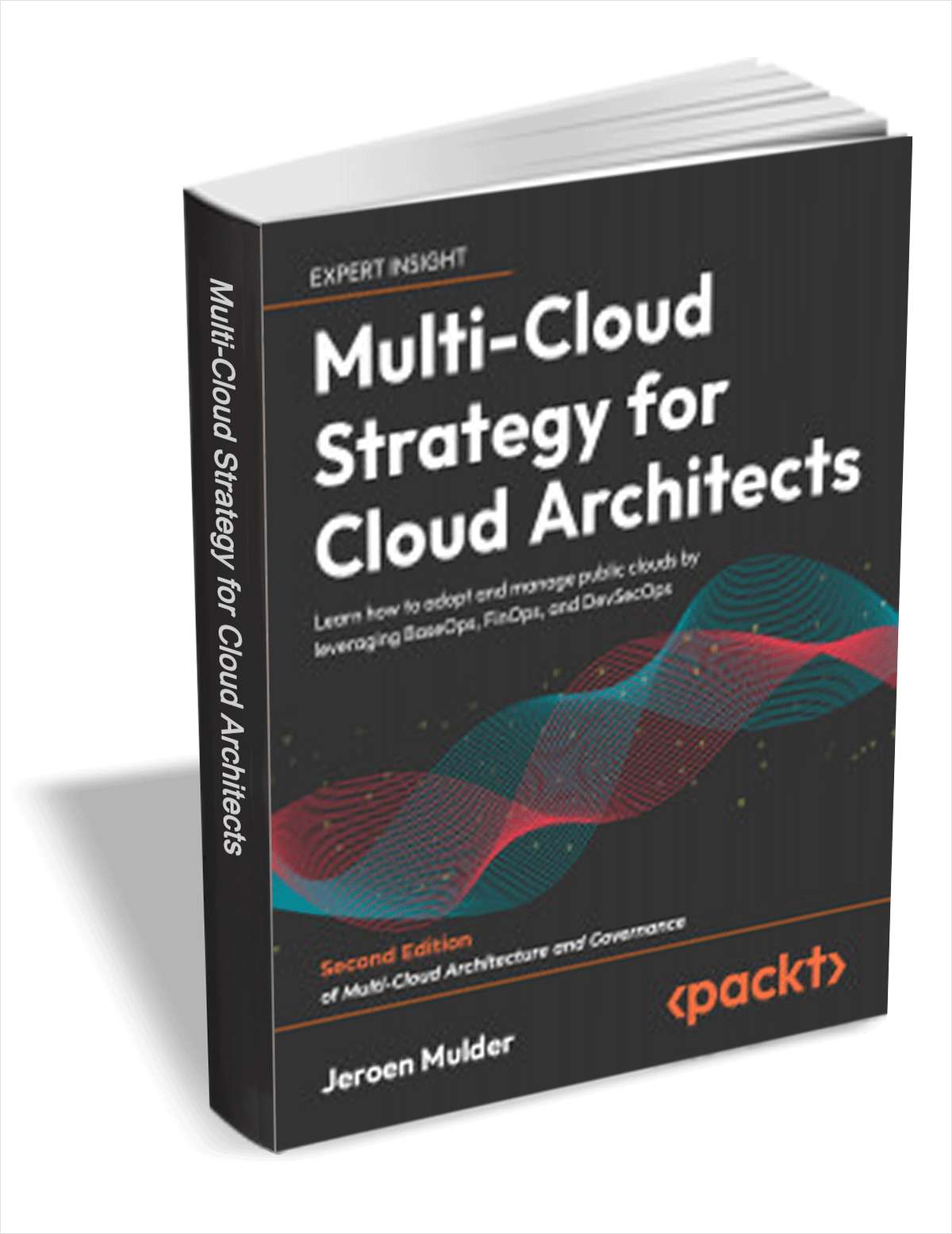
Get 'Multi-Cloud Strategy for Cloud Architects -- Second Edition' (worth $43.99) for FREE
Are you ready to unlock the full potential of your enterprise with the transformative power of multi-cloud adoption?
As a cloud architect, you understand the challenges of navigating the vast array of cloud services and moving data and applications to public clouds. But with Multi-Cloud Strategy for Cloud Architects, Second Edition, you'll gain the confidence to tackle these complexities head-on.

Managing spending is the biggest cloud challenge
For the second year running managing cloud spending is the top challenge facing organizations, according to the latest Flexera State of the Cloud Report.
The survey of over 750 respondents shows more than a quarter of them spend over $12 million a year on cloud (29 percent), and 22 percent spend that much on SaaS.

Rising hyperscaler cloud costs prompt companies to take action
New research from Civo finds 64 percent of users of AWS, Microsoft Azure, and Google Cloud have seen an increase in cloud costs in the last 12 months.
This comes at a time when public cloud services are coming under scrutiny from the Competition and Markets Authority for their billing and pricing tactics.

Microsoft has started referring to its CBL-Mariner distro as Azure Linux
While it came as a bit of a surprise when it first became public, it has been known for some time that Microsoft has its own Linux distro called CBL-Mariner. The name has been questioned by many, and it is in the process of changing.
The CBL-Mariner moniker is set to become a thing of the past as the distro transitions to being known as Azure Linux.

Companies overspend on Kubernetes thanks to underutilization of resources
Kubernetes is one of the most widely used container tools, but failure to accurately forecast resources leads to overprovision, waste and overspending.
A new report from Kubernetes automation platform CAST AI reveals high levels of underutilization are costing businesses more than necessary.

Over 80 percent of organizations have open ports on public-facing cloud assets
A new report reveals that 81 percent of organizations have public-facing neglected cloud assets with open ports, making them prime targets for attackers who routinely perform reconnaissance to detect exposed ports and known vulnerabilities.
The report from Orca Security is based on analysis of data from billions of cloud assets on AWS, Azure, Google Cloud, Oracle Cloud, and Alibaba Cloud scanned by the Orca Cloud Security Platform in 2023.

Cloud storage vulnerable to ransomware attacks
New research from Dig reveals that cloud assets like Amazon S3 buckets and Azure Storage accounts are being left open to ransomware attacks thanks to poor configuration.
It shows that only 31 percent of S3 buckets have versioning enabled, an essential for data recovery, while just two-thirds of sensitive buckets have logging enabled, a prerequisite for detection. In addition 72 percent of remote CMK buckets are not actively monitored.

Microsoft shocks the Linux community by attending Ubuntu Summit 2023
The annual Ubuntu Summit is where people who love Linux and open-source software gather to see what’s new. This year, it’s happening in the lovely city of Riga, Latvia, from November 3-5, 2023. And guess what? Microsoft, the big name we often connect with paid software, is joining in. This new partnership hints at more teamwork between big tech companies and open-source communities.
Microsoft being part of the Ubuntu Summit 2023 shows that it's warming up to open-source software. Those attending the summit, in person or online, will get to hear from Microsoft experts. They’ll talk about cool stuff like using Linux on Windows, creating apps with .NET 8 on Ubuntu, and how Microsoft’s Azure can work smoothly with Ubuntu's snapshot service.

Over half of Azure and Google Cloud deployments fail CIS benchmarks
Cloud misconfiguration is a critical issue as it amplifies the risk of data breaches and unauthorized access. But new research from Qualys shows that many cloud deployments on major platforms are failing Center for Internet Security (CIS) benchmarks.
The report finds that on average, 50 percent of CIS Benchmarks are failing across the major providers. The average fail rate for each provider is 34 percent for AWS, 57 percent for Azure, and 60 percent for Google Cloud Platform (GCP).

New Azure offerings help speed cloud migration
The cloud offers many benefits including scalability, cost savings, and flexibility, but the migration process isn't always an easy one.
Today at Microsoft Inspire the company is launching two new offerings aimed at making it easier for enterprises to migrate to Azure.

Advanced search, analytics and AI deliver a smarter infrastructure platform
The use of infrastructure as code to define and deploy network and data center architecture has become increasingly common. Whilst it undoubtedly offers many advantages, it can create challenges too.
Pulumi is launching a new tool that unlocks analytics and search across cloud infrastructure, generates infrastructure as code from natural language prompts, and even enables novel AI-driven infrastructure automation.

Microsoft fixes Azure BingBang bug that allowed Bing search hijacking and leaked private data
Microsoft has addressed a serious flaw in Azure Active Directory which was dubbed BingBang by the security researchers that discovered it.
The vulnerability not only made it possible to manipulate Bing search results, but also to access private data from Outlook, Office 365 and Teams. The issue stemmed from an Azure misconfiguration; it dates back to January this year, but Microsoft has only just plugged the hole.

CISA releases open source Untitled Goose Tool to detect malicious activity in Azure, Azure Active Directory and Microsoft 365 environments
The CISA has launched a new security tool designed to help protect various Microsoft cloud services. The open source Untitled Goose Tool is available for both Windows and macOS.
The utility was developed by the US Cybersecurity & Infrastructure Security Agency in conjunction with Sandia National Laboratories. The aim of the tool is to help to detect and respond to malicious activity in Microsoft Azure, Azure Active Directory (AAD) and Microsoft 365 (M365) environments.

Economic uncertainty puts the focus onto cloud costs
This year marks the first time in more than a decade that managing cloud spend has overtaken security as the top challenge facing organizations, according to the latest State of the Cloud report from Flexera.
The report is based on responses of 750 respondents from a survey conducted in late 2022 and finds optimizing existing use of the cloud (cost savings) is the top initiative (reported by 62 percent of all respondents).

Microsoft announces general availability of Azure OpenAI Service and promises ChatGPT soon
AI services are more than a trend, they are a phenomenon, and every technology company wants to get in on the action. Microsoft is no exception; the company has just announced that its Azure OpenAI Service is now generally available, giving access to a far wider audience.
Microsoft is pushing Azure as "the best place to build AI workloads", and part of this involves harnessing the power of GPT-3-powered natural language. On the horizon is ChatGPT, which is described as "a fine-tuned version of GPT-3.5 that has been trained and runs inference on Azure AI infrastructure".
